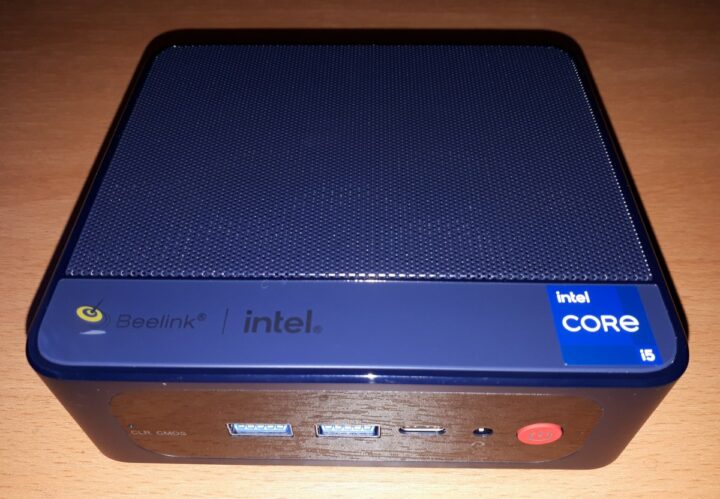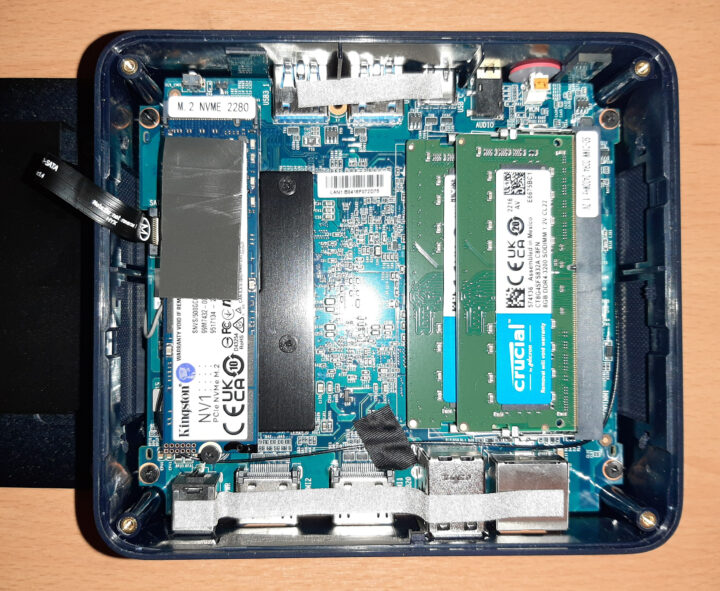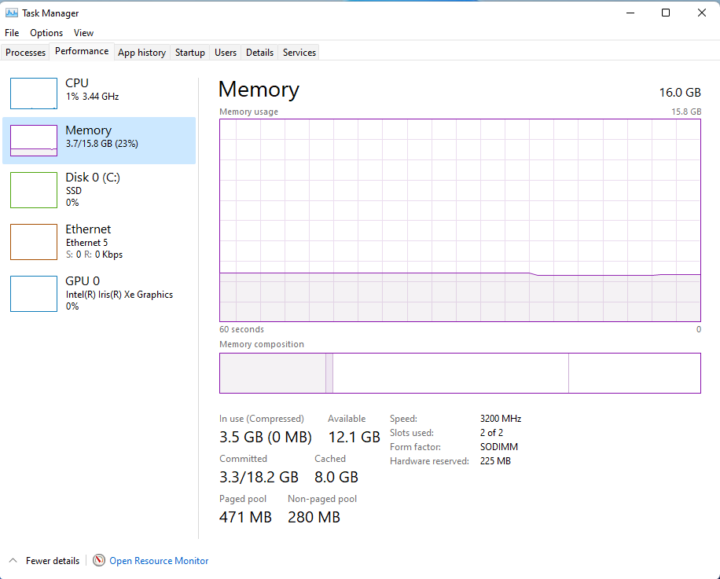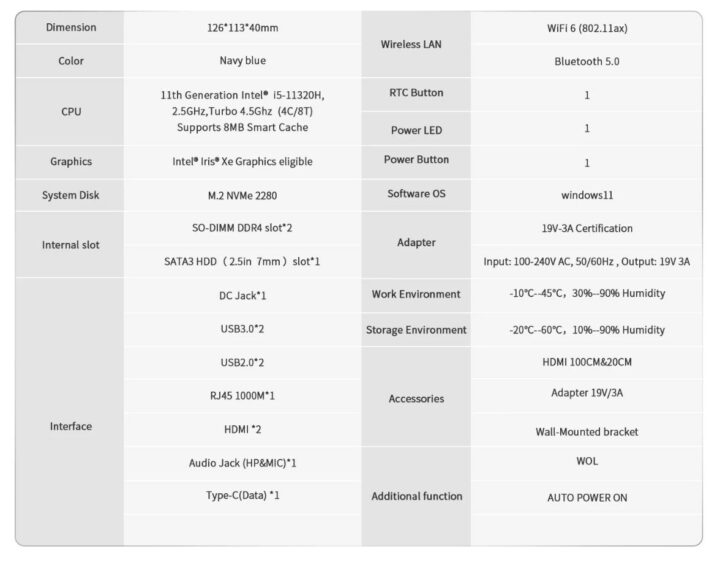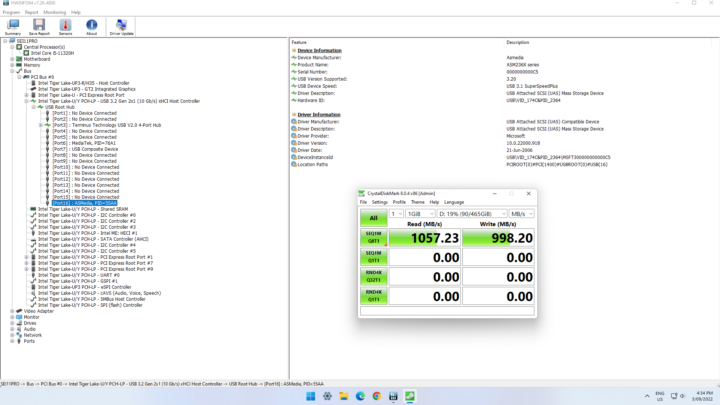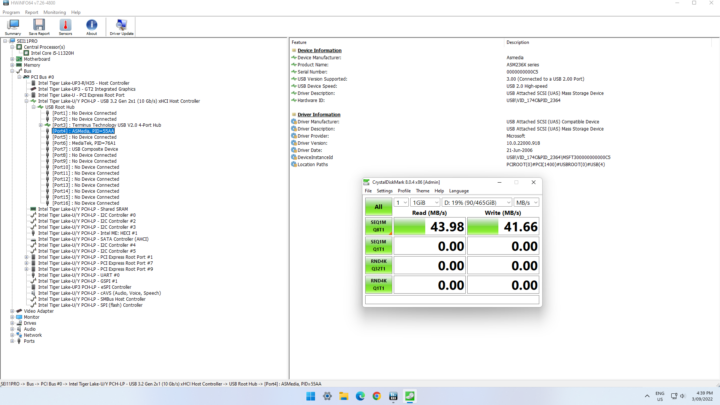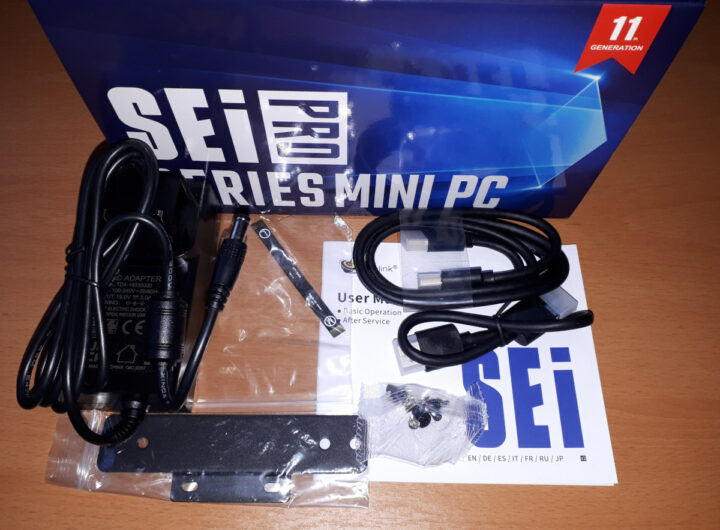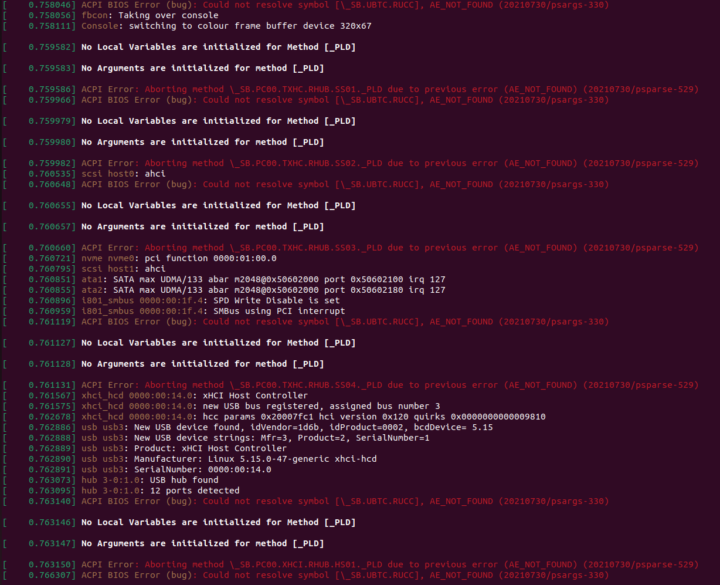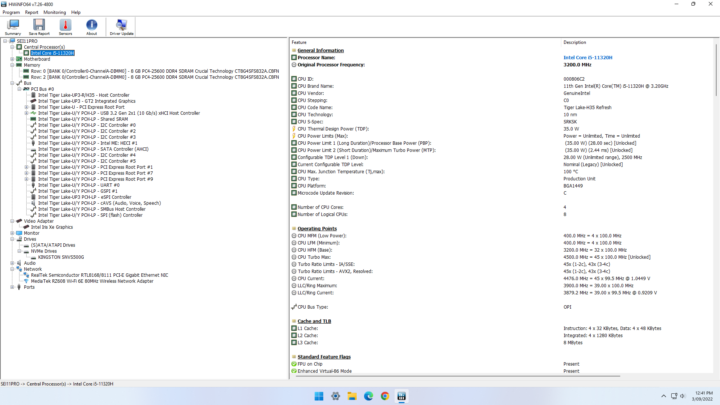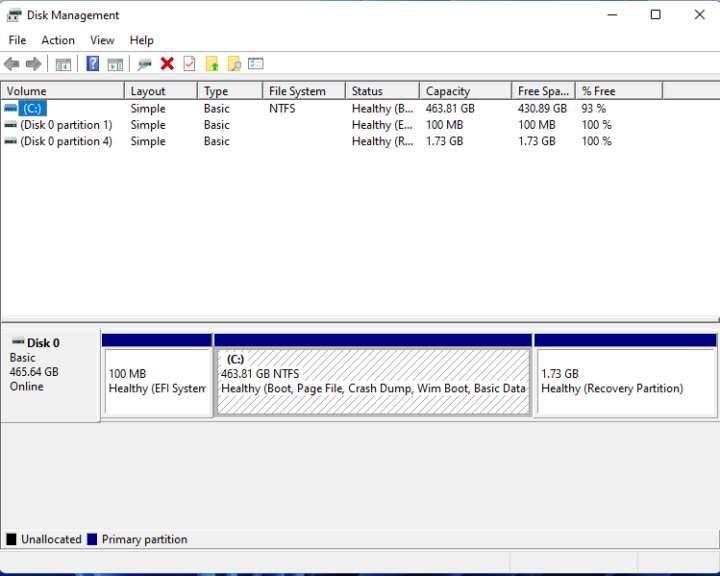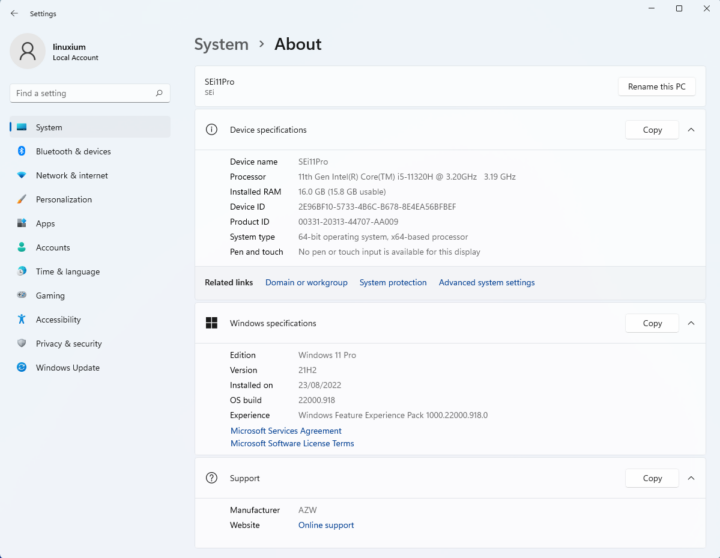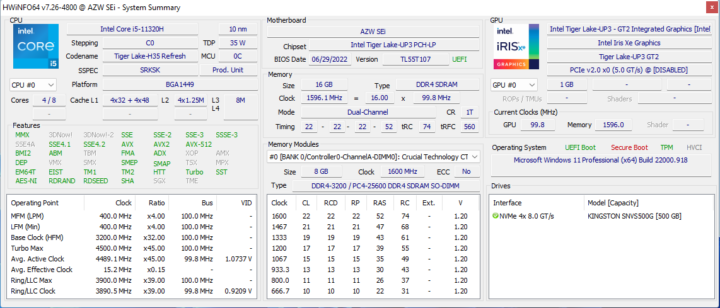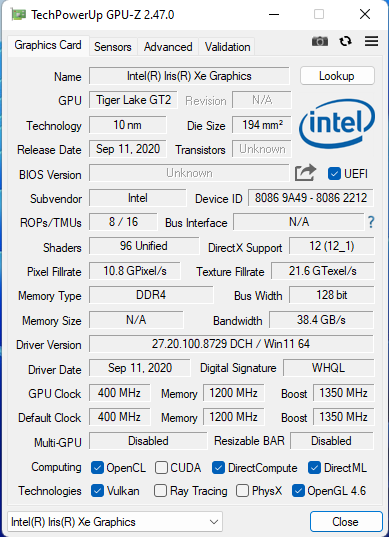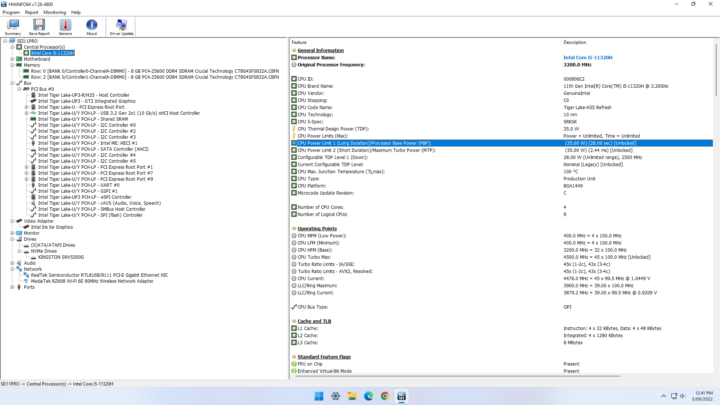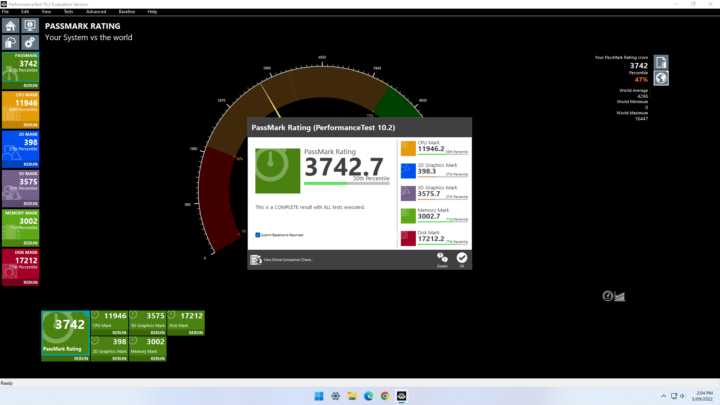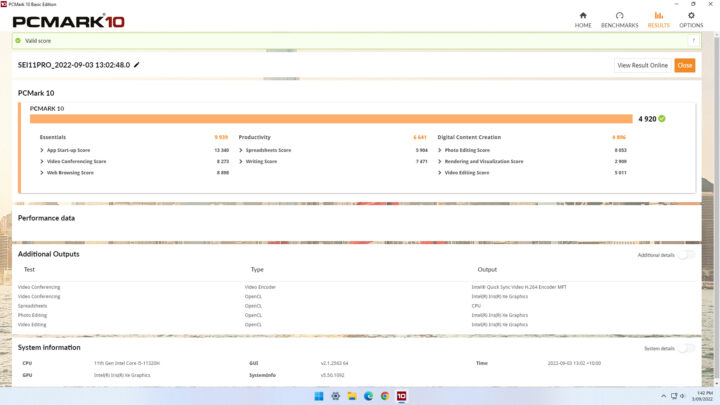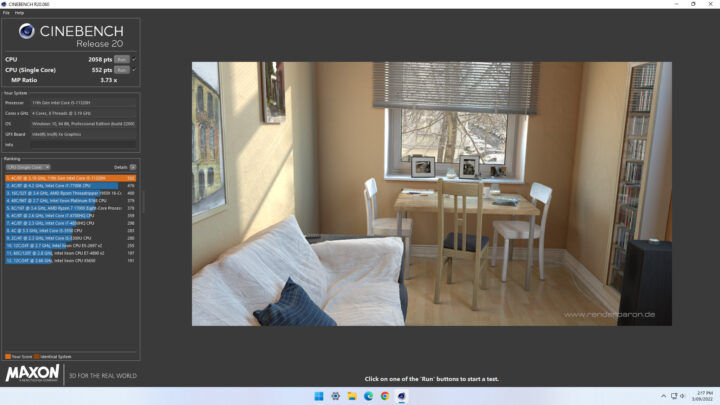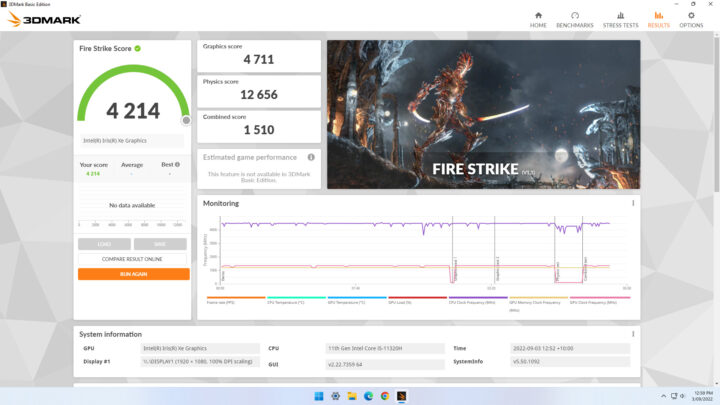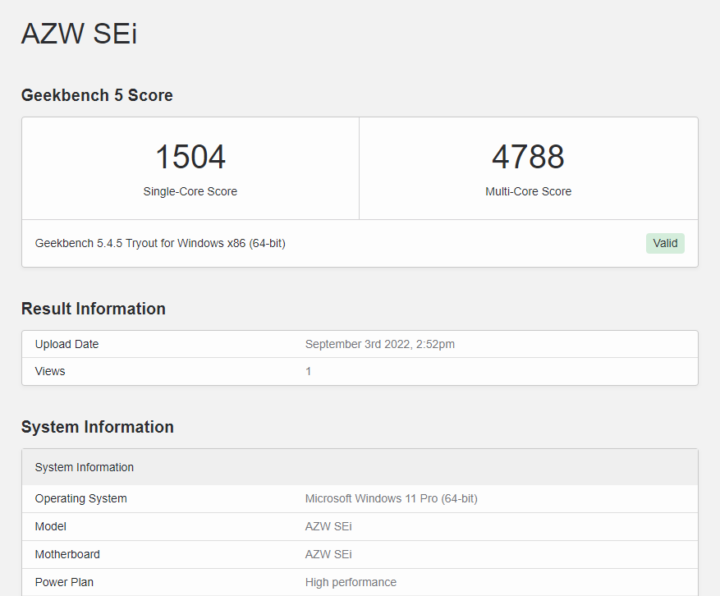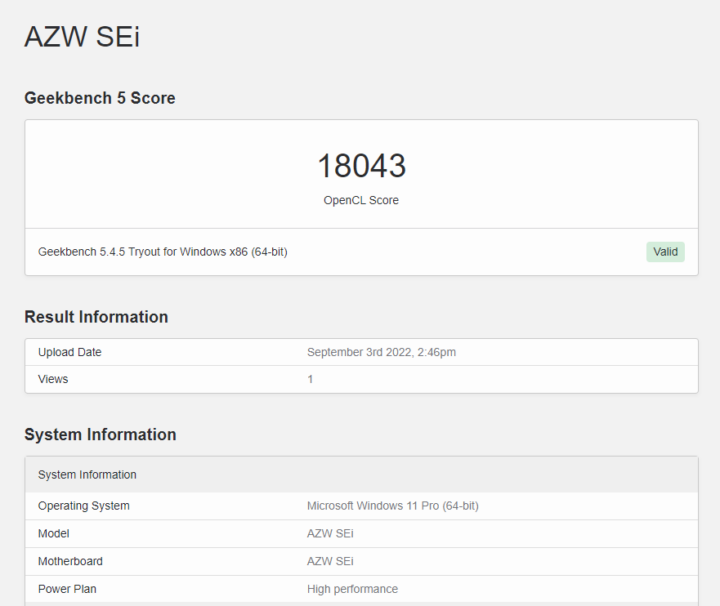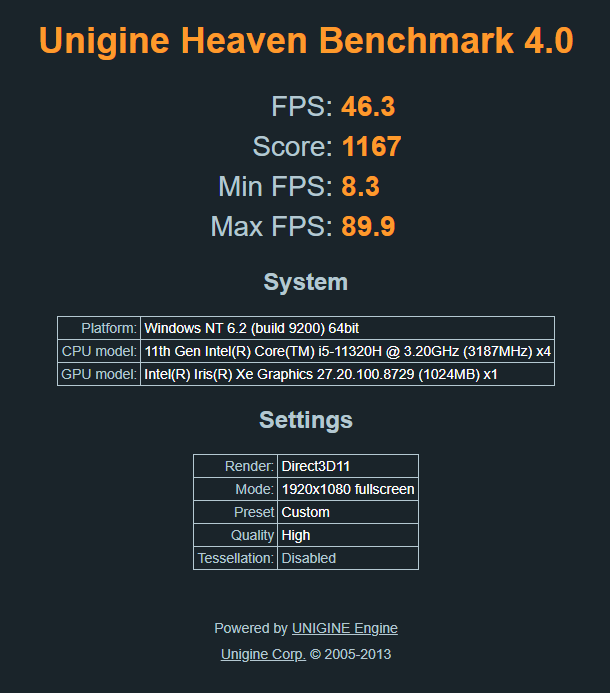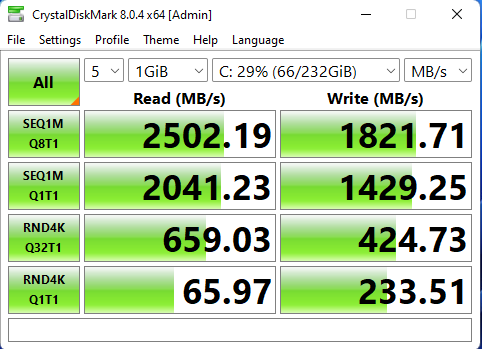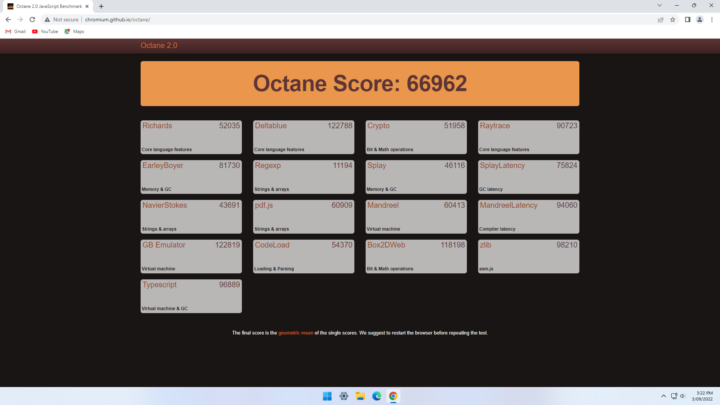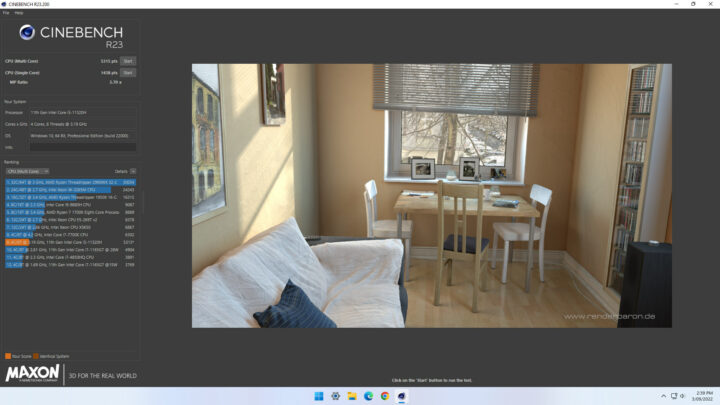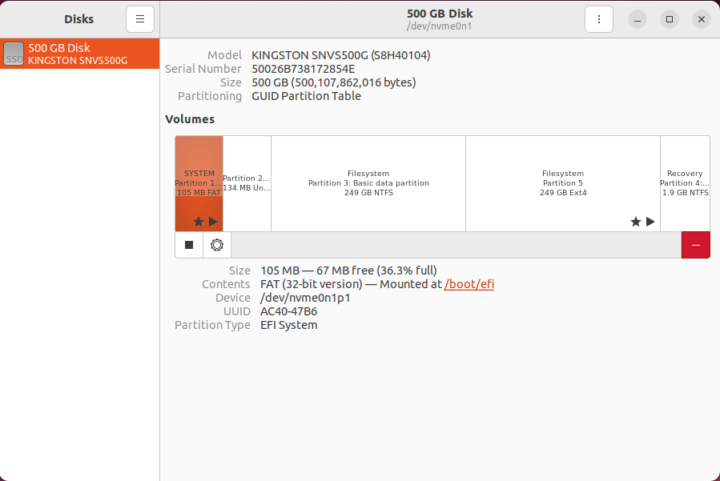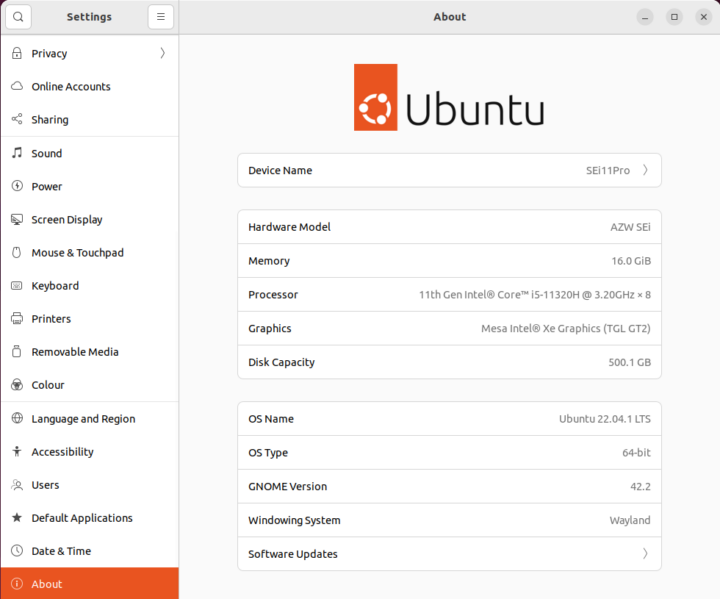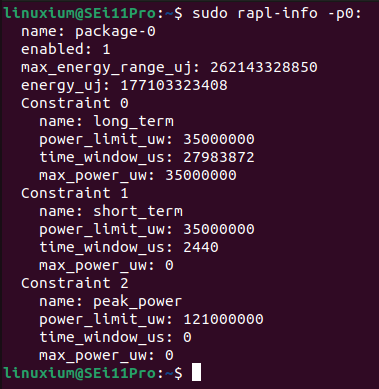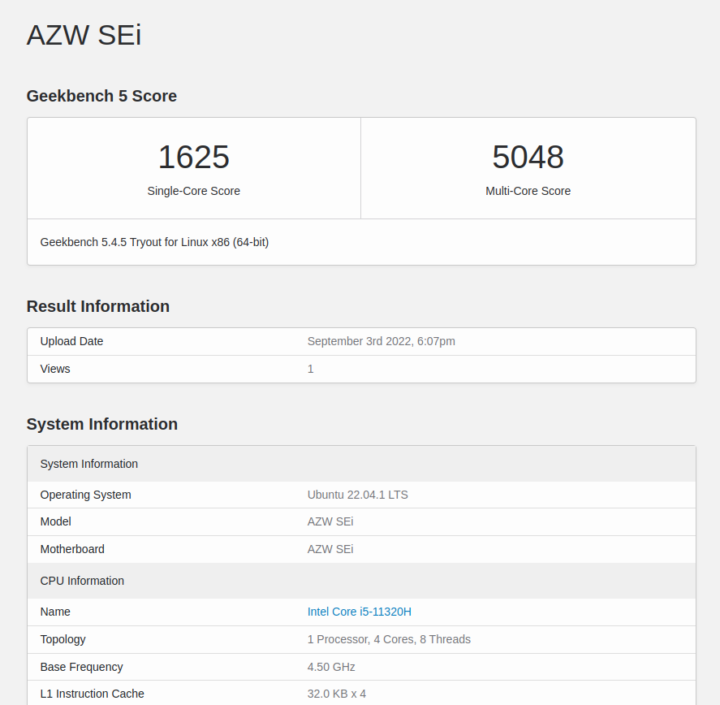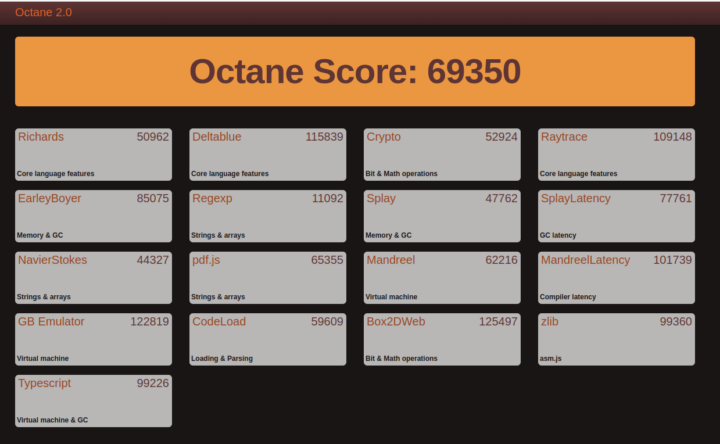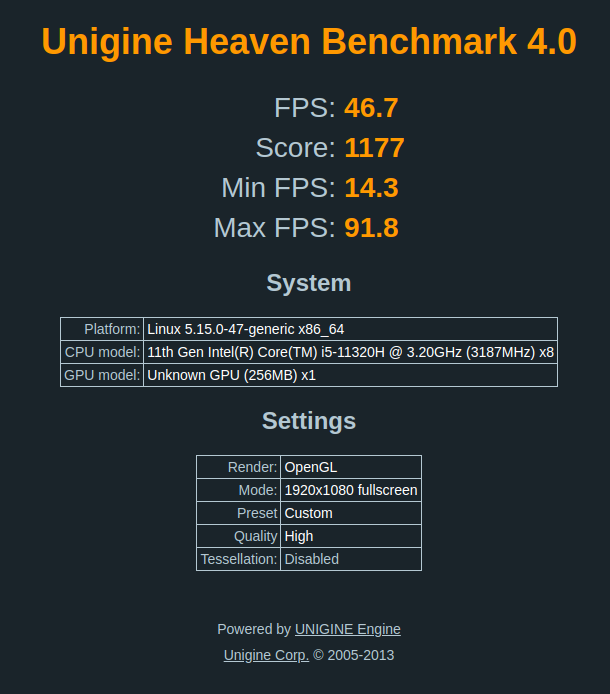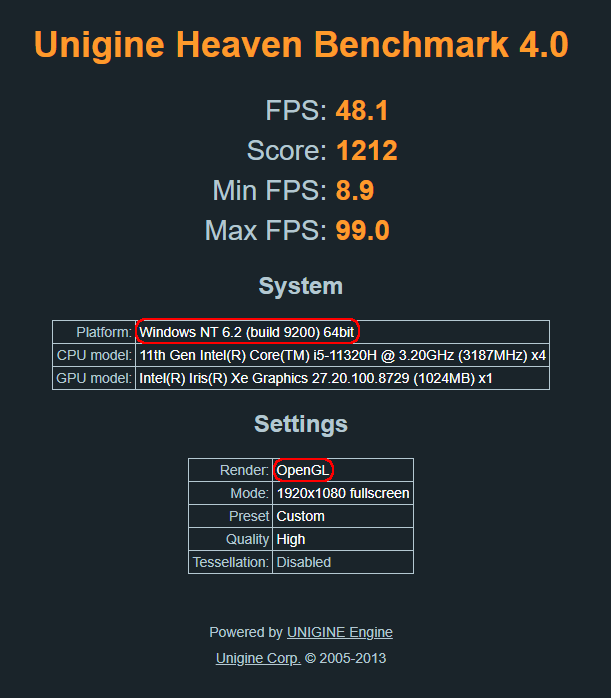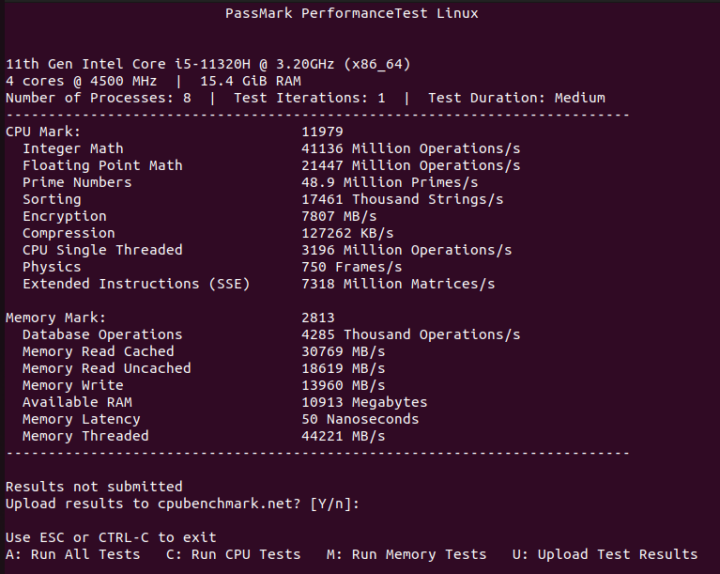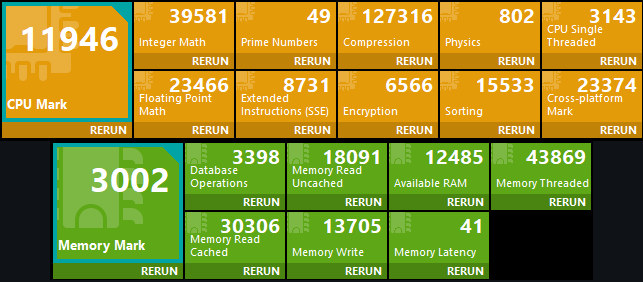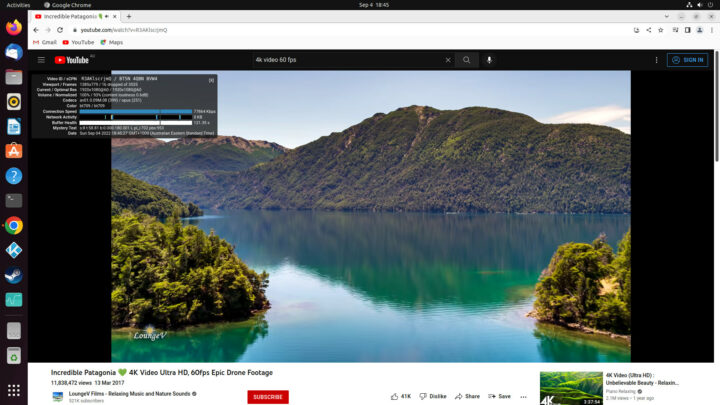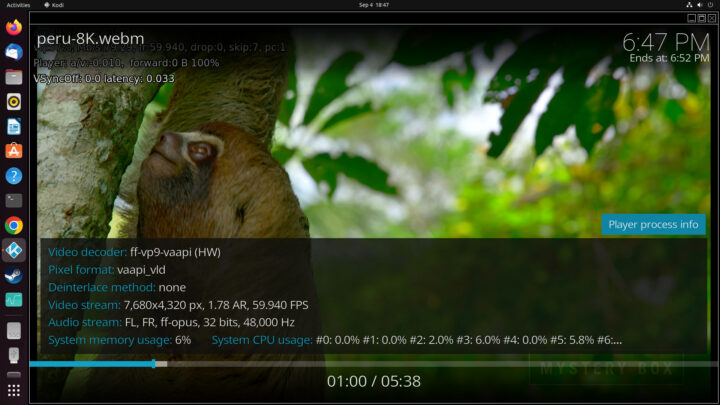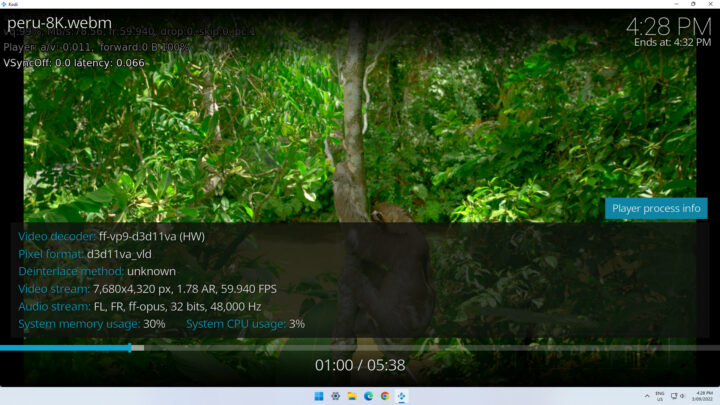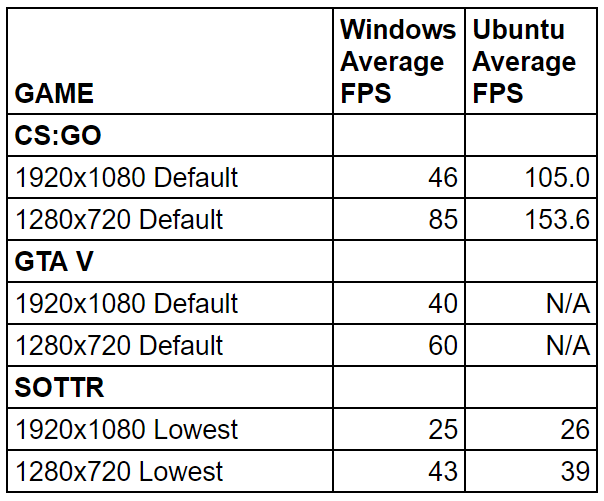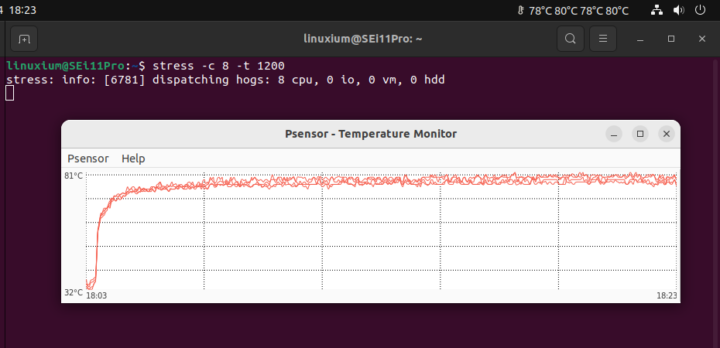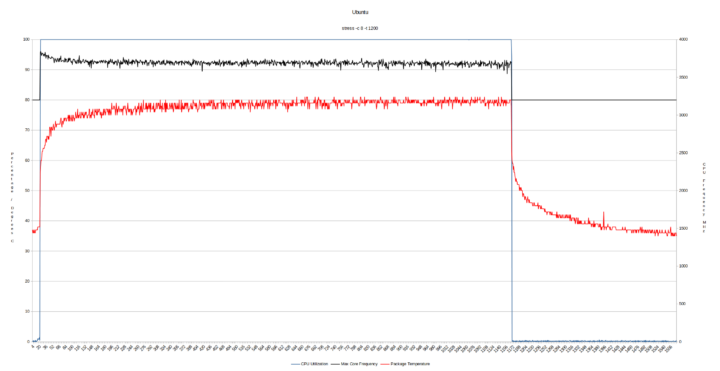The latest mini PC marketed in the ‘Pro’ range from Beelink is the SEi11 Pro and features one of last year’s Intel H-series processors typically used in gaming laptops. Beelink kindly sent one for review and I’ve looked at performance running both Windows 11 and Ubuntu 22.04.
Beelink SEi11 Pro hardware overview
The Beelink SEi11 Pro physically consists of a 126 x 113 x 40mm (4.96 x 4.45 x 1.57 inches) square metal case. As an actively cooled mini PC, it uses Intel’s ‘10 nm SuperFin’ Tiger Lake processor and the review model included an i5-11320H which is a quad-core 8-thread 3.20 GHz Core processor (at 35W TDP) boosting to 4.50 GHz with Intel’s Iris Xe Graphics.
The front panel has an illuminated power button, a 3.5mm headphone jack, a data-only Type-C USB 3.1 port, dual USB 3.1 ports and a reset pin-hole ‘CLR CMOS’. The rear panel includes a gigabit Ethernet port, dual USB 2.0 ports, dual HDMI 2.0 ports and the power jack.
Internally there is a M.2 2230 WiFi 6E (or 802.11ax) Mediatek MT7921K card which supports the new 6 GHz band, an M.2 2280 NVMe PCIe Gen 3.0 SSD drive (the review model included a 500 GB Kingston NV1 drive complete with Windows 11 Pro installed) and the ability to add a 2.5” SATA drive to the lid which is connected to the motherboard via a short ZIF cable:
There are also two SODIMM memory slots supporting up to 64 GB of memory and the review model included two sticks of Crucial 8 GB DDR4 3200 MHz memory for a total of 16 GB noting that this particular memory is single-rank:
The specifications state:
and lists all of the USB ports as 3.0, so I tested them together with the Type-C USB port using a Samsung 980 PRO PCle 4.0 NVMe M.2 SSD housed in an ‘USB to M.2 NVMe adapter’ (ORICO M2PAC3-G20 M.2 NVMe SSD Enclosure) which showed that all the ‘blue’ USB ports and the Type-C USB port were USB 3.1 (USB 3.2 Gen 2×1 i.e. 10 Gbit/s):
and that the ‘black’ rear USB ports were USB 2.0:
Unfortunately the Type-C port is neither a Thunderbolt port:
despite the controller showing up in ‘lspci’ on Ubuntu (see key hardware information under Ubuntu 22.04.1 below), nor is it capable of supporting video output through ‘Alternate Mode’:
so the device can only support two 4K displays via the HDMI ports:

Box contents
In the box, you get a power adapter and cord, both a short and a longer HDMI cable, a VESA mounting bracket, a spare ZIF cable for connecting a 2.5” SATA drive together with a small packet of miscellaneous screws. Also included is a multilingual user manual:
Review Methodology
When reviewing mini PCs, I typically look at their performance under both Windows and Linux (Ubuntu) and compare them against some of the more recently released mini PCs. I now review using Windows 11 version 21H2 and Ubuntu 22.04.1 LTS. I test with a selection of commonly used Windows benchmarks and/or equivalents for Linux together with Thomas Kaiser’s ‘sbc-bench’ which is a small set of different CPU performance tests focusing on server performance when run on Ubuntu. On Ubuntu, I also compile the v5.15 Linux kernel using the default config as a test of performance using a real-world scenario.
Prior to benchmarking, I perform all necessary installations and updates to run the latest version of the OS. I also capture some basic details of the device for each OS.
Installation Issues
When booting Ubuntu 22.04.1 there are various error messages being reported in the ‘dmesg’ although the significance of which has not been determined:
Also on Ubuntu, having installed Steam I could not get Grand Theft Auto V to run.
The initial launch errored stating that the ‘Rockstar Games Launcher failed to initialize’:
Thereafter starting the game always failed to launch:
Even after both verifying the game data as instructed and then downloading and reinstalling the 100+ GB game it still failed with the same errors.
Beelink SEi11 Pro performance in Windows 11
The Beelink SEi11 Pro came installed with a licensed copy of Windows 11 Pro version 21H2 which after applying updates was build 22000.918. A quick look at the hardware information shows it is aligned to the specification:
A brief check showed working audio, Wi-Fi, Bluetooth and Ethernet.
I first checked the CPU power limits and confirmed that both ‘PL1’ and ‘PL2’ were set at 35 Watts:
I then set the power mode to ‘High performance’ and ran my standard set of benchmarking tools to look at performance under Windows:
I also tested Cinebench R23:
All these results can then be compared with other recent mini PCs:
The Beelink SEi11 Pro performance is very similar to the previously reviewed Beelink GTi11. The extra iGPU ‘Execution Units’ result in better benchmark graphics performance however this does not extend to gaming performance which remains similar as shown below.
Ubuntu 22.04 Performance
After shrinking the Windows partition in half and creating a new partition, I installed Ubuntu as dual boot using an Ubuntu 22.04.1 ISO. After installation and updates a brief check showed working audio, Wi-Fi, Bluetooth and Ethernet.
The key hardware information under Ubuntu 22.04.1 is as follows:
|
1 2 3 4 5 6 7 8 9 10 11 12 13 14 15 16 17 18 19 20 21 22 23 24 25 26 27 28 29 30 31 32 33 34 35 36 37 38 39 40 41 42 43 44 45 46 47 48 49 50 51 52 53 54 55 56 57 58 59 60 61 62 63 64 65 66 67 68 69 70 71 72 73 74 75 76 77 78 79 80 81 82 83 84 85 86 87 88 89 90 91 92 93 94 95 96 97 98 99 100 101 102 103 104 105 106 107 108 109 110 111 112 113 114 115 116 117 118 119 120 121 122 123 124 125 126 127 128 129 130 131 132 133 134 135 136 137 138 139 140 141 142 143 144 145 146 147 148 149 150 151 152 153 154 155 156 157 158 159 160 161 162 163 164 165 166 167 168 169 170 171 172 173 174 175 176 177 178 179 180 181 182 183 184 185 186 187 188 189 190 191 192 193 194 195 196 197 198 199 200 201 202 203 204 205 206 207 208 209 210 211 212 213 214 215 216 217 218 219 220 221 222 223 224 225 226 227 228 229 230 231 232 233 234 235 236 237 238 239 240 241 242 243 244 245 246 247 248 249 250 251 |
linuxium@SEi11Pro:~$ lsb_release -a Distributor ID: Ubuntu Description: Ubuntu 22.04.1 LTS Release: 22.04 Codename: jammy linuxium@SEi11Pro:~$ linuxium@SEi11Pro:~$ uname -a Linux SEi11Pro 5.15.0-47-generic #51-Ubuntu SMP Thu Aug 11 07:51:15 UTC 2022 x86_64 x86_64 x86_64 GNU/Linux linuxium@SEi11Pro:~$ linuxium@SEi11Pro:~$ inxi -Fzc0y-1 System: Kernel: 5.15.0-47-generic x86_64 bits: 64 Console: pty pts/1 Distro: Ubuntu 22.04.1 LTS (Jammy Jellyfish) Machine: Type: Desktop Mobo: AZW model: SEi v: V1.0 serial: <filter> UEFI: American Megatrends LLC. v: TL55T107 date: 06/29/2022 CPU: Info: quad core model: 11th Gen Intel Core i5-11320H bits: 64 type: MT MCP cache: L2: 5 MiB Speed (MHz): avg: 1098 min/max: 400/4500 cores: 1: 704 2: 922 3: 553 4: 615 5: 663 6: 800 7: 656 8: 3871 Graphics: Device-1: Intel TigerLake-LP GT2 [Iris Xe Graphics] driver: i915 v: kernel Display: server: X.Org v: 1.22.1.1 driver: gpu: i915 note: X driver n/a resolution: 1920x1080~60Hz OpenGL: renderer: Mesa Intel Xe Graphics (TGL GT2) v: 4.6 Mesa 22.0.5 Audio: Device-1: Intel Tiger Lake-LP Smart Sound Audio driver: snd_hda_intel Device-2: KTMicro KT USB Audio type: USB driver: hid-generic,snd-usb-audio,usbhid Sound Server-1: ALSA v: k5.15.0-47-generic running: yes Sound Server-2: PulseAudio v: 15.99.1 running: yes Sound Server-3: PipeWire v: 0.3.48 running: yes Network: Device-1: Realtek RTL8111/8168/8411 PCI Express Gigabit Ethernet driver: r8169 IF: enp3s0 state: up speed: 1000 Mbps duplex: full mac: <filter> Device-2: MEDIATEK driver: mt7921e IF: wlp4s0 state: down mac: <filter> Bluetooth: Device-1: MediaTek Wireless_Device type: USB driver: btusb Report: hciconfig ID: hci0 state: up address: <filter> bt-v: 3.0 Drives: Local Storage: total: 465.76 GiB used: 12.95 GiB (2.8%) ID-1: /dev/nvme0n1 vendor: Kingston model: SNVS500G size: 465.76 GiB Partition: ID-1: / size: 227.21 GiB used: 12.92 GiB (5.7%) fs: ext4 dev: /dev/nvme0n1p5 ID-2: /boot/efi size: 96 MiB used: 32.3 MiB (33.7%) fs: vfat dev: /dev/nvme0n1p1 Swap: Alert: No swap data was found. Sensors: System Temperatures: cpu: 34.0 C mobo: N/A Fan Speeds (RPM): N/A Info: Processes: 262 Uptime: 2m Memory: 15.41 GiB used: 1.25 GiB (8.1%) Shell: new-review-test inxi: 3.3.13 linuxium@SEi11Pro:~$ linuxium@SEi11Pro:~$ df -h Filesystem Size Used Avail Use% Mounted on tmpfs 1.6G 2.1M 1.6G 1% /run /dev/nvme0n1p5 228G 13G 203G 6% / tmpfs 7.8G 0 7.8G 0% /dev/shm tmpfs 5.0M 4.0K 5.0M 1% /run/lock /dev/nvme0n1p1 96M 33M 64M 34% /boot/efi tmpfs 1.6G 100K 1.6G 1% /run/user/1000 linuxium@SEi11Pro:~$ linuxium@SEi11Pro:~$ lsblk -a NAME MAJ:MIN RM SIZE RO TYPE MOUNTPOINTS loop0 7:0 0 4K 1 loop /snap/bare/5 loop1 7:1 0 62M 1 loop /snap/core20/1587 loop2 7:2 0 163.3M 1 loop /snap/firefox/1635 loop3 7:3 0 400.8M 1 loop /snap/gnome-3-38-2004/112 loop4 7:4 0 91.7M 1 loop /snap/gtk-common-themes/1535 loop5 7:5 0 45.9M 1 loop /snap/snap-store/582 loop6 7:6 0 47M 1 loop /snap/snapd/16292 loop7 7:7 0 284K 1 loop /snap/snapd-desktop-integration/14 loop8 7:8 0 0B 0 loop nvme0n1 259:0 0 465.8G 0 disk ├─nvme0n1p1 259:1 0 100M 0 part /boot/efi ├─nvme0n1p2 259:2 0 128M 0 part ├─nvme0n1p3 259:3 0 231.9G 0 part ├─nvme0n1p4 259:4 0 1.7G 0 part └─nvme0n1p5 259:5 0 231.9G 0 part / linuxium@SEi11Pro:~$ linuxium@SEi11Pro:~$ sudo lshw -C cpu *-cpu description: CPU product: 11th Gen Intel(R) Core(TM) i5-11320H @ 3.20GHz vendor: Intel Corp. physical id: 4a bus info: cpu@0 version: 6.140.2 serial: <filter> slot: U3E1 size: 4464MHz capacity: 4500MHz width: 64 bits clock: 100MHz capabilities: lm fpu fpu_exception wp vme de pse tsc msr pae mce cx8 apic sep mtrr pge mca cmov pat pse36 clflush dts acpi mmx fxsr sse sse2 ss ht tm pbe syscall nx pdpe1gb rdtscp x86-64 constant_tsc art arch_perfmon pebs bts rep_good nopl xtopology nonstop_tsc cpuid aperfmperf tsc_known_freq pni pclmulqdq dtes64 monitor ds_cpl vmx est tm2 ssse3 sdbg fma cx16 xtpr pdcm pcid sse4_1 sse4_2 x2apic movbe popcnt tsc_deadline_timer aes xsave avx f16c rdrand lahf_lm abm 3dnowprefetch cpuid_fault epb cat_l2 invpcid_single cdp_l2 ssbd ibrs ibpb stibp ibrs_enhanced tpr_shadow vnmi flexpriority ept vpid ept_ad fsgsbase tsc_adjust bmi1 avx2 smep bmi2 erms invpcid rdt_a avx512f avx512dq rdseed adx smap avx512ifma clflushopt clwb intel_pt avx512cd sha_ni avx512bw avx512vl xsaveopt xsavec xgetbv1 xsaves split_lock_detect dtherm ida arat pln pts hwp hwp_notify hwp_act_window hwp_epp hwp_pkg_req avx512vbmi umip pku ospke avx512_vbmi2 gfni vaes vpclmulqdq avx512_vnni avx512_bitalg avx512_vpopcntdq rdpid movdiri movdir64b fsrm avx512_vp2intersect md_clear flush_l1d arch_capabilities cpufreq configuration: cores=4 enabledcores=4 microcode=38 threads=8 linuxium@SEi11Pro:~$ linuxium@SEi11Pro:~$ sudo lshw -C memory *-firmware description: BIOS vendor: American Megatrends International, LLC. physical id: 0 version: TL55T107 date: 06/29/2022 size: 64KiB capabilities: pci upgrade shadowing cdboot bootselect socketedrom edd int13floppynec int13floppytoshiba int13floppy360 int13floppy1200 int13floppy720 int13floppy2880 int5printscreen int14serial int17printer int10video acpi usb biosbootspecification uefi *-memory description: System Memory physical id: 3a slot: System board or motherboard size: 16GiB *-bank:0 description: SODIMM DDR4 Synchronous 3200 MHz (0.3 ns) product: CT8G4SFS832A.C8FN vendor: Crucial Technology physical id: 0 serial: <filter> slot: Controller0-ChannelA-DIMM0 size: 8GiB width: 64 bits clock: 3200MHz (0.3ns) *-bank:1 description: SODIMM DDR4 Synchronous 3200 MHz (0.3 ns) product: CT8G4SFS832A.C8FN vendor: Crucial Technology physical id: 1 serial: <filter> slot: Controller1-ChannelA-DIMM0 size: 8GiB width: 64 bits clock: 3200MHz (0.3ns) *-cache:0 description: L1 cache physical id: 46 slot: L1 Cache size: 192KiB capacity: 192KiB capabilities: synchronous internal write-back data configuration: level=1 *-cache:1 description: L1 cache physical id: 47 slot: L1 Cache size: 128KiB capacity: 128KiB capabilities: synchronous internal write-back instruction configuration: level=1 *-cache:2 description: L2 cache physical id: 48 slot: L2 Cache size: 5MiB capacity: 5MiB capabilities: synchronous internal write-back unified configuration: level=2 *-cache:3 description: L3 cache physical id: 49 slot: L3 Cache size: 8MiB capacity: 8MiB capabilities: synchronous internal write-back unified configuration: level=3 *-memory UNCLAIMED description: RAM memory product: Tiger Lake-LP Shared SRAM vendor: Intel Corporation physical id: 14.2 bus info: pci@0000:00:14.2 version: 30 width: 64 bits clock: 33MHz (30.3ns) capabilities: pm cap_list configuration: latency=0 resources: iomemory:600-5ff iomemory:600-5ff memory:6002124000-6002127fff memory:6002131000-6002131fff linuxium@SEi11Pro:~$ linuxium@SEi11Pro:~$ free -mh total used free shared buff/cache available Mem: 15Gi 751Mi 13Gi 223Mi 935Mi 14Gi Swap: 0B 0B 0B linuxium@SEi11Pro:~$ linuxium@SEi11Pro:~$ sudo lshw -C network *-network description: Ethernet interface product: RTL8111/8168/8411 PCI Express Gigabit Ethernet Controller vendor: Realtek Semiconductor Co., Ltd. physical id: 0 bus info: pci@0000:03:00.0 logical name: enp3s0 version: 15 serial: <filter> size: 1Gbit/s capacity: 1Gbit/s width: 64 bits clock: 33MHz capabilities: pm msi pciexpress msix bus_master cap_list ethernet physical tp mii 10bt 10bt-fd 100bt 100bt-fd 1000bt-fd autonegotiation configuration: autonegotiation=on broadcast=yes driver=r8169 driverversion=5.15.0-47-generic duplex=full firmware=rtl8168h-2_0.0.2 02/26/15 ip=<filter> latency=0 link=yes multicast=yes port=twisted pair speed=1Gbit/s resources: irq:18 ioport:3000(size=256) memory:50404000-50404fff memory:50400000-50403fff *-network description: Wireless interface product: MEDIATEK Corp. vendor: MEDIATEK Corp. physical id: 0 bus info: pci@0000:04:00.0 logical name: wlp4s0 version: 00 serial: <filter> width: 64 bits clock: 33MHz capabilities: pciexpress msi pm bus_master cap_list ethernet physical wireless configuration: broadcast=yes driver=mt7921e driverversion=5.15.0-47-generic firmware=____010000-20220209150915 latency=0 link=no multicast=yes wireless=IEEE 802.11 resources: iomemory:600-5ff iomemory:600-5ff iomemory:600-5ff irq:140 memory:6000000000-60000fffff memory:6000100000-6000103fff memory:6000104000-6000104fff linuxium@SEi11Pro:~$ linuxium@SEi11Pro:~$ sudo lshw -C display *-display description: VGA compatible controller product: TigerLake-LP GT2 [Iris Xe Graphics] vendor: Intel Corporation physical id: 2 bus info: pci@0000:00:02.0 logical name: /dev/fb0 version: 03 width: 64 bits clock: 33MHz capabilities: pciexpress msi pm vga_controller bus_master cap_list rom fb configuration: depth=32 driver=i915 latency=0 mode=2560x1080 resolution=2560,1080 visual=truecolor xres=2560 yres=1080 resources: iomemory:600-5ff iomemory:400-3ff irq:141 memory:6001000000-6001ffffff memory:4000000000-400fffffff ioport:4000(size=64) memory:c0000-dffff memory:4010000000-4016ffffff memory:4020000000-40ffffffff linuxium@SEi11Pro:~$ linuxium@SEi11Pro:~$ lsusb Bus 004 Device 001: ID 1d6b:0003 Linux Foundation 3.0 root hub Bus 003 Device 005: ID 31b2:0010 KTMicro KT USB Audio Bus 003 Device 003: ID 0e8d:0608 MediaTek Inc. Wireless_Device Bus 003 Device 007: ID 093a:2510 Pixart Imaging, Inc. Optical Mouse Bus 003 Device 006: ID 10d5:55a4 Uni Class Technology Co., Ltd 4 Port KVMSwicther Bus 003 Device 004: ID 045e:07f8 Microsoft Corp. Wired Keyboard 600 (model 1576) Bus 003 Device 002: ID 1a40:0101 Terminus Technology Inc. Hub Bus 003 Device 001: ID 1d6b:0002 Linux Foundation 2.0 root hub Bus 002 Device 001: ID 1d6b:0003 Linux Foundation 3.0 root hub Bus 001 Device 001: ID 1d6b:0002 Linux Foundation 2.0 root hub linuxium@SEi11Pro:~$ linuxium@SEi11Pro:~$ lspci -nn 00:00.0 Host bridge [0600]: Intel Corporation 11th Gen Core Processor Host Bridge/DRAM Registers [8086:9a14] (rev 02) 00:02.0 VGA compatible controller [0300]: Intel Corporation TigerLake-LP GT2 [Iris Xe Graphics] [8086:9a49] (rev 03) 00:06.0 PCI bridge [0604]: Intel Corporation 11th Gen Core Processor PCIe Controller [8086:9a09] (rev 02) 00:0d.0 USB controller [0c03]: Intel Corporation Tiger Lake-LP Thunderbolt 4 USB Controller [8086:9a13] (rev 02) 00:14.0 USB controller [0c03]: Intel Corporation Tiger Lake-LP USB 3.2 Gen 2x1 xHCI Host Controller [8086:a0ed] (rev 30) 00:14.2 RAM memory [0500]: Intel Corporation Tiger Lake-LP Shared SRAM [8086:a0ef] (rev 30) 00:15.0 Serial bus controller [0c80]: Intel Corporation Tiger Lake-LP Serial IO I2C Controller #0 [8086:a0e8] (rev 30) 00:15.2 Serial bus controller [0c80]: Intel Corporation Tiger Lake-LP Serial IO I2C Controller #2 [8086:a0ea] (rev 30) 00:15.3 Serial bus controller [0c80]: Intel Corporation Tiger Lake-LP Serial IO I2C Controller #3 [8086:a0eb] (rev 30) 00:16.0 Communication controller [0780]: Intel Corporation Tiger Lake-LP Management Engine Interface [8086:a0e0] (rev 30) 00:17.0 SATA controller [0106]: Intel Corporation Device [8086:a0d3] (rev 30) 00:19.0 Serial bus controller [0c80]: Intel Corporation Tiger Lake-LP Serial IO I2C Controller #4 [8086:a0c5] (rev 30) 00:19.1 Serial bus controller [0c80]: Intel Corporation Tiger Lake-LP Serial IO I2C Controller #5 [8086:a0c6] (rev 30) 00:1c.0 PCI bridge [0604]: Intel Corporation Device [8086:a0b8] (rev 30) 00:1c.6 PCI bridge [0604]: Intel Corporation Device [8086:a0be] (rev 30) 00:1d.0 PCI bridge [0604]: Intel Corporation Tiger Lake-LP PCI Express Root Port #9 [8086:a0b0] (rev 30) 00:1e.0 Communication controller [0780]: Intel Corporation Tiger Lake-LP Serial IO UART Controller #0 [8086:a0a8] (rev 30) 00:1e.3 Serial bus controller [0c80]: Intel Corporation Tiger Lake-LP Serial IO SPI Controller #1 [8086:a0ab] (rev 30) 00:1f.0 ISA bridge [0601]: Intel Corporation Tiger Lake-LP LPC Controller [8086:a082] (rev 30) 00:1f.3 Audio device [0403]: Intel Corporation Tiger Lake-LP Smart Sound Technology Audio Controller [8086:a0c8] (rev 30) 00:1f.4 SMBus [0c05]: Intel Corporation Tiger Lake-LP SMBus Controller [8086:a0a3] (rev 30) 00:1f.5 Serial bus controller [0c80]: Intel Corporation Tiger Lake-LP SPI Controller [8086:a0a4] (rev 30) 01:00.0 Non-Volatile memory controller [0108]: Kingston Technology Company, Inc. Device [2646:500f] (rev 03) 03:00.0 Ethernet controller [0200]: Realtek Semiconductor Co., Ltd. RTL8111/8168/8411 PCI Express Gigabit Ethernet Controller [10ec:8168] (rev 15) 04:00.0 Network controller [0280]: MEDIATEK Corp. Device [14c3:0608] linuxium@SEi11Pro:~$ |
I first checked the CPU power limits and confirmed that both ‘PL1’ and ‘PL2’ were set at 35 Watts:
I then set the CPU Scaling Governor to ‘performance’ and ran my Linux benchmarks for which the majority of the results are text based but the graphical ones included:
and the latter can be directly compared to when run in Windows using the OpenGL render:
I also ran PassMark PerformanceTest Linux:
which can be directly compared to the results from when it was run on Windows:
The complete results together with comparison against other recent mini PCs are:
Again the improved graphics performance compared with the GTI11 due to the increased number of ‘Execution Units’ can be seen in the benchmarks.
Video playback in browsers & Kodi
For real-world testing I played some videos in Edge, Chrome and Kodi on Windows and in Firefox, Chrome and Kodi on Ubuntu. No issues were encountered playing upto 4K 60 FPS videos on Windows:
however Chrome did occasionally drop frames on Ubuntu at 4K 60 FPS and also when the quality was dropped to 1080p:
I also played variously encoded videos in Kodi all of which played up to 8K @ 60 FPS without issue and used hardware for decoding:
Gaming on Beelink SEi11 Pro
I attempted to test three games under Steam (Counter-Strike: Global Offensive, Grand Theft Auto V and Shadow Of The Tomb Raider) at both 1080p and 720p using default settings in both CS:GO and GTA V and with the graphical preset of ‘lowest’ in the built-in benchmark of SOTTR. As mentioned above, GTA V failed to run on Ubuntu, however the average FPS results for the games that worked were as follows:
Notable is that CS:GO on Ubuntu is nearly twice as fast as on Windows. It is also interesting to see the gaming performance improvement since the GTi11 was tested. Being a similar mini PC whose gaming performance is comparable on Windows, the noticeable Ubuntu improvement is likely due to Valve’s ongoing commitment to Linux.
Thermals
The Beelink SEi11 Pro uses active cooling. Running a stress test on Ubuntu saw the CPU temperature climb to an average of 79°C with occasionally peaking at 81°C:
During the stress test the maximum temperature I recorded on the top of the device was around 26.5°C in an ambient room temperature of 15.9°C and the fan was hardly audible reaching 41 dBA on my sound meter next to the device during the test. If the CPU frequency is monitored during the stress test it can be seen that it averages 3690 MHz during the test:
Networking (Ethernet and WiFi)
Network connectivity throughput was measured on Ubuntu using ‘iperf3’:
and showed good WiFi performance.
Power consumption
Power consumption was measured as follows:
- Powered off (shutdown) – 0.6 Watts
- UEFI (BIOS) – 17.1 Watts
- GRUB boot menu – 16.4 Watts
- Idle – 10.3 Watts (Windows) and 9.4 Watts (Ubuntu)
- CPU stressed* – 46.0 Watts (Windows ‘Cinebench’) and 47.9 Watts (Ubuntu ‘stress’)
*The power figures fluctuate due to the fan so the value is the average of the median high and median low power readings.
UEFI (BIOS)
Powering up the mini PC and hitting the F7 key results in a boot menu which includes access to the UEFI (BIOS) which is relatively unrestricted.
Final Observations
Whilst the SEi11 Pro uses a newer Tiger Lake mobile processor with additional ‘Execution Units’ the performance is only marginally better that the GTi11 so this mini PC should be seen as an alternative rather than as an upgrade. Equally significant is that the USB Type-C port on the GTi11 functions as Thunderbolt 4 and supports video output through ‘Alternate Mode’ and this is missing from the SEi11 Pro.
| Highlights | Limitations |
|---|---|
| Improved graphics performance | No Thunderbolt or ‘Alternate Mode’ support |
| Additional SATA drive expandability | No SD card slot |
I’d like to thank Beelink for providing the Beelink SEi11 Pro for review. It retails at around $429 for the tested configuration of 16GB/500GB on the Beelink website, and you’ll also find it on Amazon.

Ian is interested in mini PCs and helps with reviews of mini PCs running Windows, Ubuntu and other Linux operating systems. You can follow him on Facebook or Twitter.
Support CNX Software! Donate via cryptocurrencies, become a Patron on Patreon, or purchase goods on Amazon or Aliexpress


